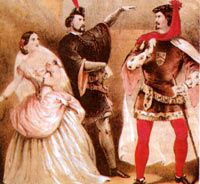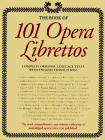|
view operas online! |
||
|
|
|||
Grand Opéra
From the later 1820s Paris saw the creation of operas of greater pretensions in the grand opéra staged by the Opéra, the leading official company, itself. These operas, which reach a height of grandeur and spectacle in the work of Meyerbeer, were held in the highest esteem. The first grand opéra , in 1828, was Auber's La muette de Portici (The Dumb Girl of Portici), followed in 1829 by Rossini's last opera Guillaume Tell (William Tell). From Meyerbeer came Le prophète , Les Huguenots and L'africaine. These involved elaborate and complex spectacle. The scenery offered a degree of realism and often of grandeur. Crowd scenes allowed the chorus to act, rather than stand in formal poses, while music added to general effect. Examples of grand opéra retain in themselves their own place in operatic history but also deserve attention for the effect they had on other opera on a similarly grand and spectacular scale, works by Verdi and by Wagner. Socially the Opéra was important. Its magnificence reflected the growing wealth and prosperity of the country and of its upper classes.
One of the most distinguished French musicians and composers of the nineteenth century, b. in Paris, on 17 June, 1818; d. there, 17 October, 1893. His father, a painter and architect of some distinction and a man of high character and sensitive nature, died when Charles was still in his childhood, and his education devolved upon his mother, a gifted pianist, who used her talents to provide for her two sons, Charles and Urbain. Gounod was sent early to the Lycée Saint-Louis, where he was one of the best scholars. His musical gifts, strikingly apparent from his earliest childhood, were carefully developed by his mother. He received his first great musical impression at the age of thirteen, when his mother took him to hear Rossini's opera "Otello", the principal roles of which were presented by Malibran, Rubini, Lablache, and Tamburini, four of the greatest singers the world has ever heard. That same year he witnessed a performance of Mozart's "Don Juan" and was raised by it to a high pitch of enthusiasm. In fact Mozart remained Gounod's ideal throughout his career. Other works which he heard at this period and which left lasting effects upon his mind were Beethoven's Pastoral and Ninth Symphonies. Having taken his degree as Bachelier-ès-lettres at the Lycée, he was sent by his mother to the Conservatoire, where he entered the theory classes of Reicha and Lesueur. Subsequently he studied counterpoint and composition under Halévy and Paer, professors in the same institution.
|
|||
| top
|
|||











